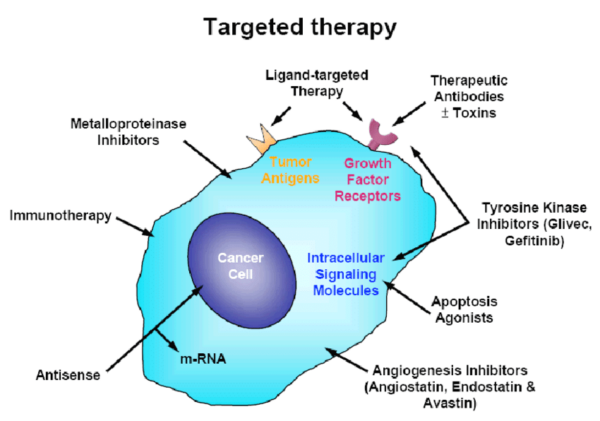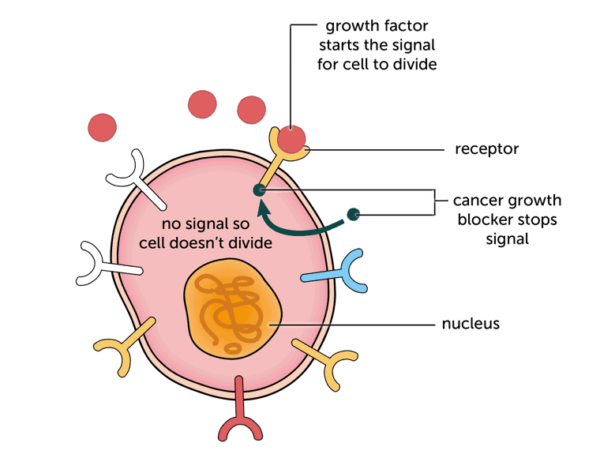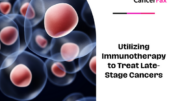How Targeted Therapy is Revolutionizing Advanced Cancer Treatment?
Targeted Therapy in Advanced Cancer: A Precision Approach to Treatment
Targeted therapy has significantly transformed the therapeutic options for advanced cancer in the field of oncology. Targeted therapy differs from conventional chemotherapy in that it specifically targets cancer cells while limiting harm to healthy cells, as opposed to generally attacking rapidly dividing cells. The ability to achieve this level of accuracy is facilitated by the identification of distinct molecular changes, or biomarkers, that are exclusive to cancer cells. Oncologists can customize treatment regimens to be more efficient and less harmful by comprehending the molecular characteristics of malignancies.
This article explores the fundamental principles, practical applications, and recent progress in targeted therapy for advanced cancer. The field of oncology is currently undergoing a remarkable revolution due to the introduction of targeted therapy. Targeted therapy specifically targets the molecular abnormalities that cause cancer growth, in contrast to standard chemotherapy, which destroys all rapidly developing cells without discrimination. This customized method signifies the beginning of a new period in cancer therapy, providing a source of optimism for individuals fighting advanced phases of the illness.

Understanding Targeted Therapy
Targeted therapy is a treatment approach that uses medications or other substances to disrupt specific molecules that have a role in the development, advancement, and dissemination of cancer. The targets, sometimes referred to as molecules, encompass proteins, genes, or other compounds that play a crucial role in the survival and rapid growth of cancer cells. Targeted therapy specifically inhibits the activity of certain targets that are frequently overexpressed or mutated in cancer cells, as opposed to chemotherapy, which affects all rapidly dividing cells, including healthy ones.
An important benefit of targeted therapy is its capacity to selectively target cancer cells, resulting in potentially reduced side effects in comparison to conventional chemotherapy. In addition, targeted medicines can be more efficacious as they capitalize on distinct weaknesses in cancer cells while preserving normal cells.
Types of Targeted Therapy
There are several types of targeted therapies used in the treatment of advanced cancers:
- Monoclonal Antibodies: These are laboratory-produced molecules designed to mimic the immune system’s ability to fight cancer. Monoclonal antibodies can target specific proteins on cancer cells, blocking their growth signals or flagging them for destruction by the immune system.
- Small Molecule Inhibitors: These are drugs that can enter cancer cells and interfere with specific molecules inside the cells. By blocking the action of these molecules, small-molecule inhibitors can inhibit the growth and survival of cancer cells.
- Angiogenesis Inhibitors: Tumors require a blood supply to grow beyond a certain size. Angiogenesis inhibitors block the formation of new blood vessels that tumors need to grow, thereby starving the tumor of nutrients and oxygen.
- Signal Transduction Inhibitors: These drugs interfere with specific pathways that are involved in the growth and survival of cancer cells. By disrupting these pathways, signal transduction inhibitors can inhibit cancer cell proliferation.
Molecular Profiling and Personalized Medicine
Central to the success of targeted therapy is molecular profiling of tumors. This involves analyzing the genetic and molecular characteristics of a patient’s tumor to identify specific mutations or biomarkers that can be targeted with specific drugs. Molecular profiling allows oncologists to select the most appropriate targeted therapy for each patient, leading to a more personalized and effective treatment approach.
Advancements in technology, such as next-generation sequencing (NGS), have facilitated comprehensive molecular profiling of tumors. NGS allows for the simultaneous analysis of multiple genes, enabling oncologists to identify rare mutations and tailor treatment strategies accordingly.
Clinical Applications
Targeted therapy has demonstrated remarkable efficacy in the treatment of various advanced cancers. For example:
- HER2-Positive Breast Cancer: Monoclonal antibodies like trastuzumab (Herceptin) target the HER2 protein overexpressed in some breast cancers, leading to improved outcomes in HER2-positive breast cancer patients.
- EGFR-Mutant Lung Cancer: Small molecule inhibitors like gefitinib (Iressa) and erlotinib (Tarceva) specifically target mutated EGFR in non-small cell lung cancer (NSCLC), resulting in improved progression-free survival.
- BRAF-Mutant melanoma: Inhibitors such as vemurafenib (Zelboraf) and dabrafenib (Tafinlar) target BRAF mutations in melanoma, significantly improving overall survival rates.

Challenges and future directions
Although targeted therapy has achieved success, there are still some problems that need to be addressed. Tumor heterogeneity and adaptive alterations in cancer cells can lead to the development of resistance to targeted therapy over time. Moreover, the process of selecting appropriate targets for certain types of tumors can be intricate, necessitating a more profound understanding of tumor biology.
The future of targeted therapy rests in the utilization of combination techniques, wherein numerous targeted drugs or a mix of targeted therapy and immunotherapy are employed to surmount resistance and enhance outcomes. Furthermore, current investigations in precision medicine strive to discover new targets and create more efficient treatments for a wider variety of tumors.
Conclusion
Targeted therapy represents a paradigm shift in the treatment of advanced cancers. By leveraging our understanding of molecular biology, oncologists can now tailor treatments that specifically target the vulnerabilities of cancer cells while minimizing damage to healthy tissues. As research continues to unravel the complexities of cancer biology, the promise of targeted therapy continues to grow, offering hope for improved outcomes and a better quality of life for patients facing advanced cancer.
FAQ’s on targeted therapy
- What is targeted therapy, and how does it differ from chemotherapy?
Targeted therapy is a type of cancer treatment that uses drugs designed to target specific genes or proteins that are involved in the growth and survival of cancer cells, unlike chemotherapy, which attacks all rapidly dividing cells, including healthy ones. - What types of cancers can be treated with targeted therapy?
Many types of cancers can be treated with targeted therapy, especially those with well-understood genetic mutations, such as certain breast, lung, and colorectal cancers. - How are patients selected for targeted therapy?
Patients are typically selected for targeted therapy based on the presence of specific genetic markers or mutations within their cancer cells, as determined through molecular profiling. - What are common side effects of targeted therapy?
Side effects vary depending on the specific drug but may include skin reactions, hypertension, fatigue, and gastrointestinal issues. - Can targeted therapy be used in combination with other cancer treatments?
Yes, targeted therapy is often used in conjunction with other treatments, such as chemotherapy, surgery, or radiation therapy, to enhance effectiveness. - How do molecular profiling and biomarkers play a role in targeted therapy?
Molecular profiling and biomarkers help identify the unique characteristics of a cancer, enabling the selection of appropriate targeted therapies that will be most effective for a particular patient. - What is the success rate of targeted therapy in advanced cancer?
The success rate of targeted therapy varies widely between cancer types and individual patient factors, but it can significantly improve outcomes for certain cancers when compared to traditional treatments. - Are there any new targeted therapies in development?
The field of targeted therapy is rapidly evolving, with numerous new drugs in clinical trials aiming to address a broader range of mutations and resistance mechanisms. - How does targeted therapy impact the quality of life for patients?
Targeted therapy can improve the quality of life by offering treatments that are more specific to the cancer cells, potentially resulting in fewer side effects than traditional chemotherapy. - What are the challenges in accessing targeted therapy treatments?
Challenges include the high cost of treatment, the need for precise diagnostic testing, and the availability of specific therapies in different regions or healthcare systems.
Dr. Nishant Mittal is a highly accomplished researcher with over 13 years of experience in the fields of cardiovascular biology and cancer research. His career is marked by significant contributions to stem cell biology, developmental biology, and innovative research techniques.
Research Highlights
Dr. Mittal's research has focused on several key areas:
1) Cardiovascular Development and Regeneration: He studied coronary vessel development and regeneration using zebrafish models1.
2) Cancer Biology: At Dartmouth College, he developed zebrafish models for studying tumor heterogeneity and clonal evolution in pancreatic cancer.
3) Developmental Biology: His doctoral work at Keio University involved identifying and characterizing medaka fish mutants with cardiovascular defects.
4) Stem Cell Research: He investigated the effects of folic acid on mouse embryonic stem cells and worked on cryopreservation techniques for hematopoietic stem cells.
Publications and Presentations
Dr. Mittal has authored several peer-reviewed publications in reputable journals such as Scientific Reports, Cardiovascular Research, and Disease Models & Mechanisms1. He has also presented his research at numerous international conferences, including the Stanford-Weill Cornell Cardiovascular Research Symposium and the Weinstein Cardiovascular Development Conference.
In summary, Dr. Nishant Mittal is a dedicated and accomplished researcher with a strong track record in cardiovascular and cancer biology, demonstrating expertise in various model systems and a commitment to advancing scientific knowledge through innovative research approaches.
- Comments Closed
- April 25th, 2024






Advanced cancer drugs, Cancer signaling pathways, Genetic biomarker testing, Molecular targeted therapy, Personalized cancer medicine, Precision Oncology, Tumor-specific treatment, Tyrosine Kinase Inhibitors
CancerFax is the most trusted online platform dedicated to connecting individuals facing advanced-stage cancer with groundbreaking cell therapies.
Send your medical reports and get a free analysis.
🌟 Join us in the fight against cancer! 🌟
Привет,
CancerFax — это самая надежная онлайн-платформа, призванная предоставить людям, столкнувшимся с раком на поздних стадиях, доступ к революционным клеточным методам лечения.
Отправьте свои медицинские заключения и получите бесплатный анализ.
🌟 Присоединяйтесь к нам в борьбе с раком! 🌟